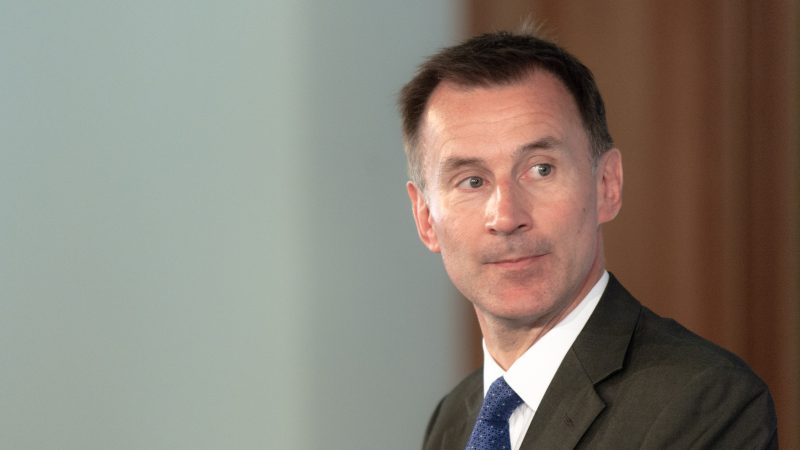
Forecasts, in politics and economics alike, are a risky business. However, it’s probably safe to predict, that this is the final budget before an election.
Hunt has the air about him of a man who knows he won’t be Chancellor in a few months’ time. If his party succeeds in pulling off a historic upset, Sunak will almost certainly want to replace him with a closer ally. If he fails Starmer will not ask him to stay on.
Hunt knows his time as Chancellor is limited
His economic decisions make most sense in this context.
The Conservative Party has decided that he needs to offer a substantial and broad-based tax cut and has made the necessary changes across the tax and spending profile for this to pay off. They are continuing to increase taxes on the poorest by allowing inflation to degrade thresholds, but they want to cut tax rates for political reasons.
To be clear, National Insurance is a badly designed tax, it advantages pensioners and the wealthy, doesn’t apply equally to all workers, and is much less progressive than income tax. A reduction in National Insurance is, in the long run, a good thing. The tax burden is also at a record high.
Cutting national insurance is an irresponsible move
But this tax cut is irresponsible. The government needs revenue to deal with the current cost of living crisis, and the public finances are in record disarray. Cutting NICs also adds to inflationary pressure. Hunt is making the Bank of England’s job harder and will probably slow the rate at which they can cut rates.
Mitigating the damage, of course, taxes are not actually coming down overall. It remains the case that the Chancellor is raising taxes with one hand – through threshold creep – and cutting with the other. He has also raised a strange smorgasbord of taxes – from airline duty to a vape tax, to cobble together enough for a 2p fall in the headline NICs rate.
His overall fiscal policy makes no sense, cutting some taxes whilst raising others, guided by politics and his fiscal rules and not economics. He continued to dodge the difficult decisions required for tackling climate change and restoring fiscal sustainability, continuing the decade-long farce of cutting fuel duty every year.
Hunt is guided by political, not economic, concerns
Nevertheless, the budget has broader implications for the Labour Party, especially as it finalises our manifesto for the upcoming election.
Firstly, the government has eliminated one politically salient source of funding, eliminating the non-dom exemption. Labour should resist any panic in the face of this sort of manoeuvring – it is not a huge deal in public finance terms. The Shadow Treasury team will be able to find equivalent measures without too much difficulty.
Against expectations, Hunt delivered his planned tax cuts without imposing even more unrealistic cuts on unprotected departmental spending. He was bailed out by a better-than-expected OBR assessment, and reliance a highly dubious ‘public sector productivity review.’ Both show short-sightedness from a Chancellor working out his notice.
For all intents and purposes Hunt has abandoned his fiscal rules
Nevertheless, Hunt has, to all intents and purposes, abandoned his fiscal rules.
He has spent very near to the absolute maximum amount allowable by his rules, staying within the letter of his fiscal framework only by making implausible economic and political assumptions for after his time in office.
This backdrop makes writing a Labour manifesto even more difficult.
The next government, whatever its stripe, faces a lethal combination of high taxes on working people, broken public services, stagnant growth, and no money. The Conservatives once accused labour of ‘not fixing the roof whilst the sun was shining.’ Now Jeremy Hunt is pulling the roof down, even as the rain is pouring on top of us.
The only route out of this predicament is stronger economic growth
Ultimately, the only route out of this predicament is much stronger economic growth. The Tory growth record has been the worst of any government in modern British economic history. Real GDP per capita has been falling for years now – we are becoming steadily poorer as a nation year-on-year.
But growth requires tough choices. It requires Labour to be resolute in expanding housing, even where there is local opposition. It requires closer and more constructive international economic ties. And it will require sacrifices by people today in the hope of a better and more prosperous tomorrow. As a government and as a country, we must invest, and as a result save more. Labour cannot avoid such trade-offs. If growth was easy, we’d be doing it already.
Growth also takes time. There will be endless acute pressures to divert funding away from investment. A credible and sustainable plan for economic growth will require us to say ‘no’ to things we would like to be done.
Yesterday’s budget proves two things: the Tories have not given up on the hope of winning an election and they are willing to pursue unsustainable short-term benefits to do it. They have taken leave of economic reality and are promising the impossible; the country now cannot afford another 5 years of the same. The fiscal situation is very bleak, and today’s budget made it bleaker.




More from LabourList
Letters to the Editor – week ending 8th February 2026
Morgan McSweeney resigns as Starmer’s chief of staff over Mandelson scandal
‘Branching out: how Labour lost its local roots’